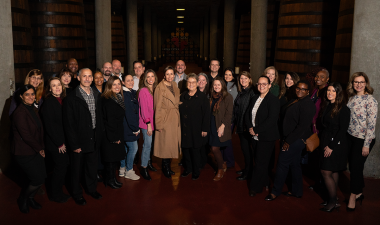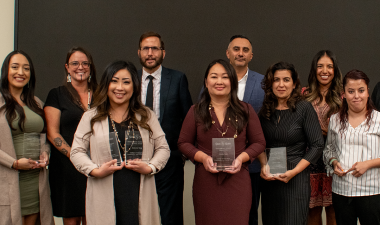Stanislaus State alumnus Leslie Rogers was immersed in family life and working as a high school teacher and football coach in Tracy in fall 2013 when his second daughter was born, and his life changed dramatically.
Shortly after birth, the baby showed signs of serious health problems and was diagnosed with infantile spasms. The next several months brought emergency room visits, hospital stays, powerful medications and an emergency flight to Doernbecher Children’s Hospital in Portland, where she was eventually diagnosed with cardiofaciocutaneous (CFC) syndrome, a rare condition caused by a de novo genetic mutation, which is a mutation present for the first time in a family.
During those terrifying months, Rogers experienced how complicated, expensive and inaccessible America’s healthcare system can be for the seriously ill and their families. It prompted him to start thinking about the actions he could take to change the system.
“My daughter’s condition and our experiences getting treatment — that’s what changed my life’s path,” said Rogers, who graduated from Stan State with a bachelor’s degree in economics in 2004, a teaching credential in 2005 and a master’s degree in public administration in 2008. “That started my efforts to work on health care reform.”
Now residing in southern Oregon and employed as the accessibility services coordinator at Umpqua Community College, Rogers has devoted himself to preserving and improving access to affordable healthcare and services for people with disabilities.
A self-taught expert, he has been appointed by Gov. Kate Brown to the State Interagency Coordinating Council to advise on special education services and to the state’s Universal Healthcare Task Force to recommend a universal care system. He serves as a disability policy advocate with the statewide Go! Project, which educates government officials and the public about disability issues. He also serves as a board member and the research committee chair for the non-profit advocacy and support group CFC International.
Over the past eight years, Rogers’ efforts have resulted in some significant victories. In his roles with CFC International, he participated in securing a $20 million National Institutes of Health (NIH) research grant, and with Disability Rights Oregon he has worked on revisions to Medicaid rules and policy changes to increase patient access to services and medical equipment.
He also played a significant role in a successful push to increase the federal government’s share of Medicaid coverage, known as FMAP, for long-term care and support services in Oregon.
“We worked to get that increase in reimbursements, and it definitely was a big win,” Rogers said. “I talked to a lot of federal legislators about it and put it on the right radar. We had to help legislators understand how it would impact families on the ground level and change the future of home- and community-based services and stabilize families to get them through the pandemic.”
Rogers grew up in Escalon as the son of parents who adopted two special needs children when he was a child, so his understanding of disability issues has developed over decades. With the birth of his second daughter, his appreciation of the issues quickly intensified. He and his wife soon found they were not only their daughter’s primary caregivers — the roles they expected — but also her tireless advocates, insurance analysts and care strategists. And when the medical bills started pouring in, Rogers quickly became a meticulous accountant, checking charges and making sure insurers paid what they should.
The couple’s biggest shock came early in their baby’s life, when she experienced severe seizures that required a medication priced at nearly $1.7 million for the necessary six-month treatment.
“This was a medication that went from $40 a vial in 2008 to $34,500 a vial when I needed to get it in 2014,” said Rogers. “And just one vial is not enough. We would need two vials a week for six months.”
Getting the medication approved by insurers and delivered to his daughter meant a two-week battle that delayed treatment and took a toll on her condition. It turned out that the drug, developed in the 1950s, had been acquired by a company that hiked the price many times over to increase profits. As Rogers did research, he learned that other companies were doing the same thing, and it strengthened his resolve to advocate for affordable prescription drugs and changes to laws that prevent Americans from buying prescription drugs from Canada, where prices are often much lower.
Ultimately, the company that hiked the price of the drug his daughter needed came under government scrutiny and paid $100 million to settle Federal Trade Commission (FTC) charges that it violated antitrust laws. The company is now going through Chapter 11 bankruptcy proceedings.
While the future of the company is unclear and the price of the drug still hovers around $35,000 a vial, Rogers says the scrutiny and the FTC charges give him a sense of satisfaction because they reaffirm the value of advocacy and speaking out against injustices.
“There were consequences for that company, and it took several of us in different communities speaking out and saying, ‘Hey, this isn’t right, we need to change it,’ to get attention at the federal level and bring about the consequences,” he said. “What they were doing made enough people at the federal level mad, and eventually there were consequences.”



